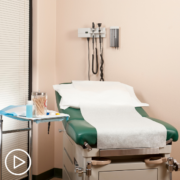Expert Perspective | Aggressive Prostate Cancer Research and Health Equity
Expert Perspective | Aggressive Prostate Cancer Research and Health Equity from Patient Empowerment Network on Vimeo.
What does research show about aggressive prostate cancer and health equity? Expert Dr. Ronald Chen from KU Medical Center discusses advanced prostate cancer research findings, the INNOVATE trial, and advanced prostate cancer disparities.
See More from [ACT]IVATED Prostate Cancer
Related Resources:

Advanced Prostate Cancer Clinical Trials | Access and NRG-GU008 Trial |

Understanding the Role of a Digital Rectal Exam in Prostate Cancer Care |

|
Transcript:
Lisa Hatfield:
Dr. Chen, can you provide an overview of your research focus around improving treatments and cure rates for patients facing an aggressive prostate cancer diagnosis? And also, two parts to this question. What inspired you to focus on the topic of health equity in relation to prostate cancer?
Dr. Ronald Chen:
Well, in terms of thinking about my research on improving treatments for advanced prostate cancer, and I’ll just define that to say, advanced prostate cancer, we usually think of as patients who have prostate cancer that has spread to other parts of the body. And so that’s often very aggressive. And, of course, in that situation, there’s still a lot of room for us to improve treatment so we can extend the survival and also improve the quality of life for these patients as much as we can. So a lot of room for improvement. And really, I think how we get to that improvement is mostly through clinical trials.
There’s a lot of promising new treatments that are more effective in tackling the cancer that also potentially can improve the patient’s quality of life, which is also a very important situation for advanced prostate cancer. And so a lot of my research really focuses on clinical trials to incorporate new treatments or new ways to do treatment for patients with advanced prostate cancer.
I’ll give one example. I lead a national trial that’s sponsored by the National Cancer Institute. It’s called NRG-GU008. We call it the INNOVATE trial. And this trial is specifically for patients who have prostate cancer that has spread to the lymph nodes. And if you have prostate cancer that has spread to the lymph nodes, that’s technically stage IV. And we, again, don’t do as well as we want to for these patients. And what this trial is testing is standard of care which would involve radiation and hormone therapy compared to standard of care, radiation/hormone therapy, plus a new drug that seems to hold promise for prostate cancer.
And, of course, we’re testing to see whether adding this new drug would reduce further spread of the cancer, improve survival, and how it impacts quality of life. And so, that’s a very important effort for no positive prostate cancer patients. And we are trying to enroll almost 600 patients, and so far we’re about 200 patients into it. So it’s an ongoing trial. It’s open across the country. And I really do hope that at the end of this trial, we’ll be able to offer a new option for these patients.
I’m involved in other trials around the country that are testing other treatments for advanced prostate cancer. And a lot of my focus on these other trials is also to sort of assess the impact of these treatments on the patient’s quality of life. I think quality of life is really important. We don’t just want to focus on being more aggressive and more aggressive and more aggressive without accounting for how the aggressive treatment really impacts a patient, how their quality of life is and side effects. And so that’s also another really important focus of my research and clinical trials.
In terms of my focus on health equity, health equity is a really important topic because even though we have pretty good treatment for prostate cancer, we know that not all patients have the same access to treatment, and not all patients have the same outcome with advanced prostate cancer. And so, studying why there is a disparity where some patient groups don’t do as well. We know for a fact that based on multiple studies, that Black patients with prostate cancer are more likely to die from prostate cancer twice as much as white patients with prostate cancer.
So we want to understand why, and once we understand why, we want to design interventions to reduce that gap, so then all patients have the same access and have good outcomes with this disease. And so I think that relates to access to screening. So we can diagnose cancer as early as we can. It relates to access to clinical trials, and that’s another really important aspect of my research focus.














